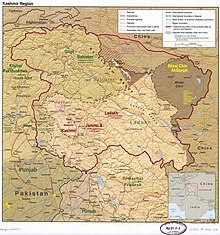
On 5 August 2019, the government of India revoked the special status, or autonomy, granted under Article 370 of the Indian constitution to Jammu and Kashmir—a region administered by India as a state which consists of the larger part of Kashmir which has been the subject of dispute among India, Pakistan, and China since 1947.[1][2]
Among the Indian government actions accompanying the revocation was the cutting off of communication lines in the Kashmir Valley which was restored after 5 months.[3] Thousands of additional security forces were deployed to curb any uprising.[4] Several leading Kashmiri politicians were taken into custody, including the former chief minister.[5][4] Government officials described these restrictions as designed for preempting violence,[6] and justified the revocation for enabling people of the state to access government programmes such as reservation, right to education and right to information.[7]
The reactions in Kashmir Valley was effectively suppressed through the suspension of communication and with imposition of Curfew (Section 144).[5][4][8] Many nationalists celebrated, declaring the move to herald public order and prosperity in Kashmir.[5] Among political parties in India, the revocation was supported by the ruling Bharatiya Janata Party, and, among others, by the Bahujan Samaj Party, the Aam Aadmi Party, AIADMK, Telugu Desam Party, YSR Congress Party, BJD, Janata Dal (United) and the Shiv Sena. It was opposed by the Indian National Congress, Jammu & Kashmir National Conference, Jammu and Kashmir Peoples Democratic Party, Communist Party of India (Marxist), Communist Party of India, Trinamool Congress and the DMK.[9] In Ladakh, people in the Kargil area, who are predominantly Shia Muslim, protested;[10][11] however, the Buddhist community in Ladakh supported the decision.[12][13]
The president of India issued an order under the power of Article 367, overriding the prevailing 1954 Presidential Order and nullifying all the provisions of autonomy granted to the state. The Home minister introduced a Reorganisation Bill in the Indian parliament, seeking to divide the state into two union territories to be governed by a lieutenant governor and a unicameral legislature. The resolution seeking the revocation of the temporary special status under Article 370 and the bill for the state's reorganisation was debated and passed by the Rajya Sabha – India's upper house of parliament – on 5 August 2019.[14] On 6 August, the Lok Sabha – India's lower house of parliament – debated and passed the reorganisation bill along with the resolution recommending the revocation.[4][15][16]
- ^ Akhtar, Rais; Kirk, William. "Jammu and Kashmir, State, India". Encyclopædia Britannica. Retrieved 7 August 2019.
Jammu and Kashmir, state of India, located in the northern part of the Indian subcontinent in the vicinity of the Karakoram and westernmost Himalayan mountain ranges. The state is part of the larger region of Kashmir, which has been the subject of dispute between India, Pakistan, and China since the partition of the subcontinent in 1947.
- ^ Osmańczyk, Edmund Jan (2003). "Jammu and Kashmir.". In Mango, Anthony (ed.). Encyclopedia of the United Nations and International Agreements. Vol. 2: G–M (3rd ed.). Taylor & Francis. p. 1189. ISBN 978-0-415-93922-5.
Territory in northwestern India, subject of a dispute between India and Pakistan. It has borders with Pakistan and China.
- ^ "Prepaid mobile services restored in J-K after over five-month suspension". Business Standard India. Press Trust of India. 18 January 2020. Retrieved 6 June 2021.
- ^ a b c d "Article 370: What happened with Kashmir and why it matters". BBC News. 6 August 2019. Retrieved 10 August 2019.
- ^ a b c Gettleman, Jeffrey; Raj, Suhasini; Schultz, Kai; Kumar, Hari (5 August 2019). "India Revokes Kashmir's Special Status, Raising Fears of Unrest". The New York Times. Retrieved 15 November 2019.
- ^ Cite error: The named reference
jaishankarwas invoked but never defined (see the help page). - ^ Cite error: The named reference
TimesOfIndia2019oct31was invoked but never defined (see the help page). - ^ "Explained: What is Section 144 of CrPC?". The Indian Express. 6 August 2019. Retrieved 24 February 2021.
- ^ Cite error: The named reference
ITaugust52019was invoked but never defined (see the help page). - ^ "Ladakh's UT status triggers jubilation in Leh, resentment in Kargil". The Times of India. Press Trust of India. 5 August 2019. Retrieved 19 November 2019.
- ^ Majid, Zulfikar. "Why are Kargil people against Art 370 abrogation?". Retrieved 19 November 2019.
- ^ Ulmer, Alexandra (7 August 2019). "Buddhist enclave jubilant at new Kashmir status but China angered". The Sydney Morning Herald. Retrieved 22 August 2019.
- ^ ul Haq, Shuja (6 August 2019). "Kashmir Article 370: Ladakh too welcomes its new Union Territory status". India Today. Retrieved 22 August 2019.
- ^ Cite error: The named reference
Prabhu&Sanyalwas invoked but never defined (see the help page). - ^ Cite error: The named reference
ZeeNews2019aug6was invoked but never defined (see the help page). - ^ Cite error: The named reference
BusinessLine2019aug6was invoked but never defined (see the help page).